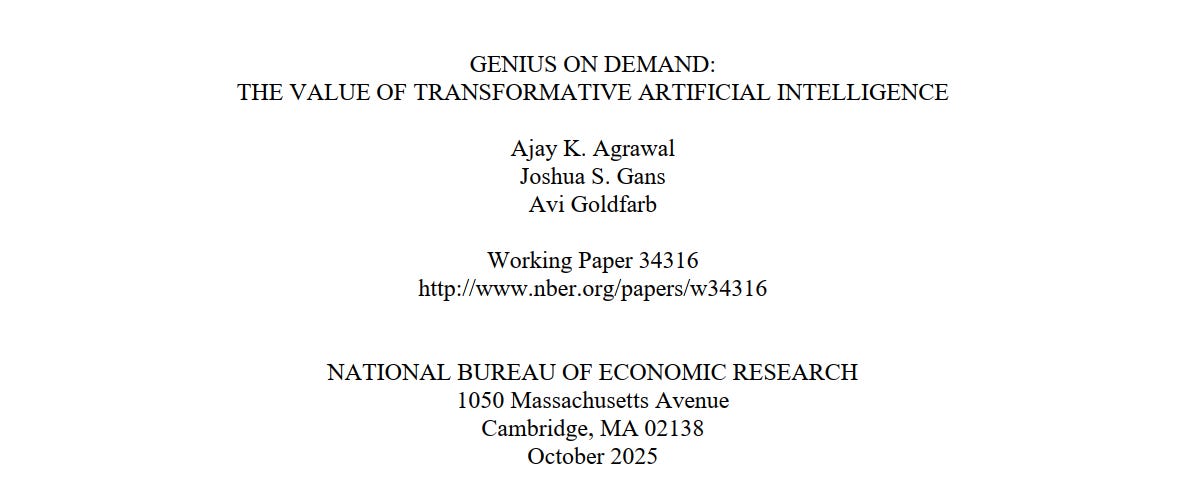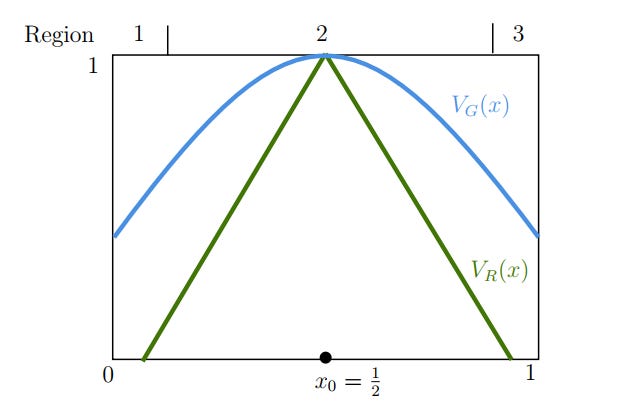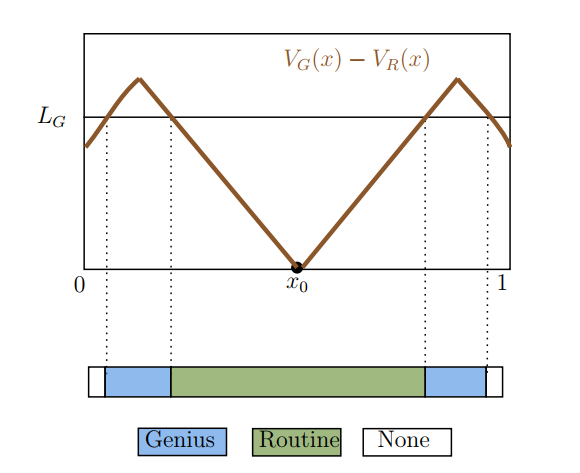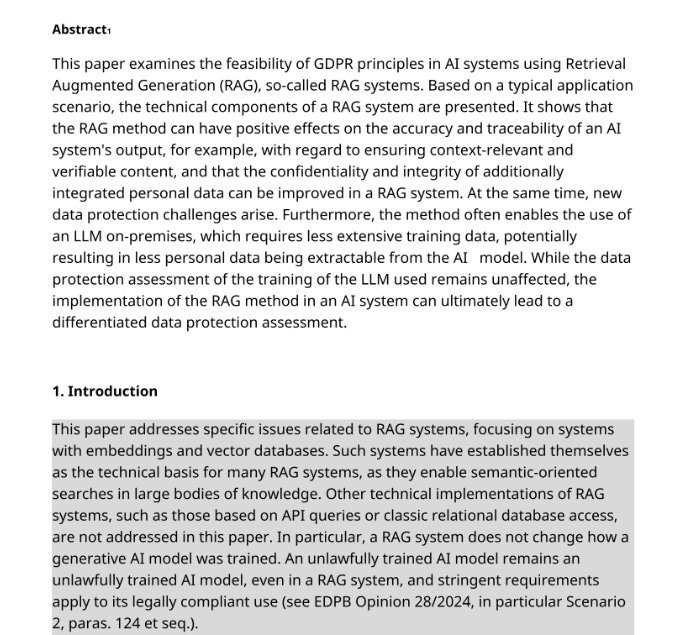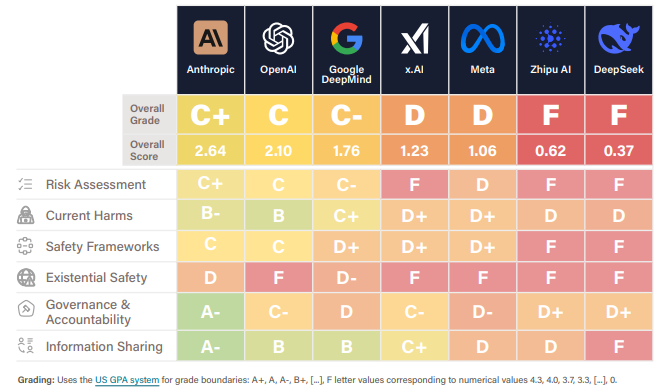#36 Ajay Agrawal explains how and when AI will take your job
Unless you're a brilliant genius
I read the book Power and Prediction by Ajay Agrawal (reportedly: one of the best professors walking the planet Earth) two years ago.</p> And I was fascinated to see how the guy had already posed and solved a bunch of questions related to the AI boom before the launch of GPT4...
That’s why, when a little elf told me that Agrawal had released a new paper in October, I dove headfirst into it...
… and cracked my bald head: the paper is one of those tough ones, filled with math formulas and unreadable developments for humanities baldies.
But the ideas and conclusions can be read and understood perfectly.
And for everything else, there’s my friend Claude: I’ve put together an infographic and a gadget so you can tinker and fully understand the scope of this impactful paper.
Download link: https://www.nber.org/books-and-chapters/economics-transformative-ai/genius-demand-value-transformative-artificial-intelligence
You are reading ZERO PARTY DATA. The newsletter on tech news from the perspective of data protection law and AI by Jorge García Herrero and Darío López Rincón.
In the spare time this newsletter leaves us, we like to solve complicated issues in personal data protection and artificial intelligence. If you have any of those, wave at us. Or contact us by email at jgh(at)jorgegarciaherrero.com
Thanks for reading Zero Party Data! Sign up!
The paper proposes the most efficient way to distribute the most complicated tasks among workers (distinguishing between mass or routine workers and genius workers) using the concept of “difficulty regions,” and then studies how these distribution rules are affected when an unlimited supply of geniuses (AI) comes into play.
First in the short term, and then in the long term.
The Structure of Knowledge and the Three Regions
To understand where people work, let’s imagine that knowledge is organized around a known point, point 0, which represents an obvious answer, an already established fact.
The difficulty or uncertainty of a question increases as we move away from that known point (on the horizontal axis -1, -2, -3 or +1, +2, +3 moving left and right from that zero point that marks the easiest stuff).
Region 2 (The Center): These are the questions close to established knowledge. Uncertainty is low. Routine workers (for example: paralegals or medical residents applying standard diagnoses) can handle them, using existing knowledge. The value of their work decreases as the question moves away from zero, but they’re still useful in this region.
Regions 1 and 3 (The Frontier): These are the questions far from established knowledge. The uncertainty is too high. Routine workers cannot reliably answer these questions and must abstain (or they are unable to answer; the value of their response, if they dare, is zero). Only genius workers have the ability to create new knowledge and can tackle these problems, although it becomes more costly the farther they are from the known point.
Geniuses shine and are more efficient in the two “twin peaks” or “eyebrows” of difficulty. Beyond that, it’s not worth wasting genius eyelashes. From there to point zero, the “routine workers” do just fine.
Assignment Rules with AI Geniuses
The emergence of Genius AI (which behaves similarly to a human genius but with unlimited supply) radically changes how the work manager (the person who decides whom to ask) distributes tasks.
Short-Term Assignment (Organizational Rigidity)
In the short term, the assignments of routine workers (those handling tasks in Region 2) remain fixed due to something that will be stronger than AI for a while: middle managers, not very effective but no fools, realize that AI is coming for their butts and will place every obstacle in the way of its deployment.
Obviously, this and other things related to the rigidities of large organizations, but I’m developing this one because I find it the funniest.
According to the paper, in this short term the impact of AI is focused on the reassignment of human geniuses:
• Human Specialization: Human geniuses are reassigned to the most difficult and distant questions from point 0, where their comparative advantage over AI is highest. They specialize in the newest stuff.
• Replacement of Intermediate Tasks: Aladdin AI replaces human geniuses in moderately difficult tasks (questions closer to known knowledge) that geniuses used to handle. Aladdin AI also begins to answer many of the previously unanswered questions in the extreme Regions 1 and 3.
Long-Term Assignment (Total Optimization)
In the long run, the manager distributing work can fully reoptimize who gets assigned to what.
If AI efficiency is high enough, it surpasses the value generated by routine workers in their own domain.
• Routine Work: Routine workers can be completely displaced if Genius AI is efficient enough to generate more value than them in Region 2.
• Ultra Human Specialization: Human geniuses are assigned exclusively to the farthest and most difficult questions, specializing in the pure frontier of knowledge.
• AI Dominance: Aladdin AI handles everything else, including what used to be routine work, “intermediate genius” tasks, and most of Regions 1 and 3.
If you want to tinker with the gadget I built with Claude, take a deep breath and do it here:
Interactive visualization of Figures 1 and 2 of the paper
Figure 3 of the paper (“Short- and Long-Term Replacement Theory”)
Or maybe you just want to enjoy one of the few workdays you have left, if you believe the great Ajay Agrawal!!
🗞️News of the Data-world 🌍
.- The AWS outage everyone is talking about. Even a security breach considering the implications for many folks who rely on Amazon for servers and storage. We’re used to saying that if it’s just an availability issue it’s just an incident (since neither the good guys nor the bad guys can access the data), but in the EDPB’s example guidelines we have both sides of the coin:
Example case 1: ransomware without exfiltration and with backup—ends up being just an availability issue. Nope.
Example case 3: a hospital where the lack of availability poses a serious risk due to the nature, sensitivity, and number of people affected.
Case-by-case elements always matter. A small company with a plot in AWS might stay at the “incident” level, but Redsys not allowing payments? That’s a full-blown breach (they were affected here).
.- Since we didn’t share news last week, here’s one from the backlog: the EDPB announcing a new coordinated enforcement action on the right to erasure for 2026. Something like that previous report evaluating compliance with the right of access.
.- €80,000 fine from the Italian Garante to hospital “Azienda Ospedaliero Universitaria Careggi” for allowing all personnel to access every patient’s medical records, regardless of whether they were attending to them. I’ve told this story often: during a training at a major City Council, I said this couldn’t be done, and someone angrily replied that ANY SACYL PHYSICIAN CAN ACCESS ANY MEDICAL RECORD OF ANYONE FROM CASTILLA Y LEÓN. Sure, with a helpful and unbreachable warning banner to scare off snoopers. Judging by the occasional criminal rulings, this is still how things are.
.- If you’re a hardcore gamer like Darío or just spent too much money on your mouse, you should know that with AI, your words can be recovered from the vibrations picked up by the device. Beat that.
📄High density docs for data junkies
.- On the right to erasure with interesting nuances, we recommend the following study commissioned by the EDPB from 2022. It seems there’s not much ground to fight over in 17.3 denial cases, but here they remind us of the CNIL’s fine for not honoring the erasure request for data that couldn’t be retained on the basis of “the establishment, exercise or defense of legal claims.”
.- A didactic, pragmatic (and why not say it, shrewd) article on IAPP by Omer Tene pointing out operational solutions to the fuss over low-intensity biometric controls. My two cents: (i) if there’s a real objective need to enforce these controls, they can be justified regardless of what the AEPD says, and I’ll die on that hill. (ii) Another functional option (though it brings other issues: like using the employee’s private device) is to use the smartphone’s biometric control linked to your access system, so it only sends the “green light” (yep, this person owns me) and nothing else.
.- A post by Luis Montezuma I haven’t read because it’s going to piss me off, and I’m writing this on a Monday. “Advocate General Maciej Szpunar’s opinion states that if a controller uses an email address to send daily newsletters under Article 13(2) of the ePrivacy Directive, and this processing is lawful, Article 6 of the GDPR does not apply.”
.- Summary by Theodore Christakis himself of a talk I’d give an arm to attend.
.- 183 pages from the European Commission on a growing hot topic: digital monitoring, algorithmic management, and platformization of work in the EU (via Rosalia Anna D’Agostino). As we’re all noticing, unions are no longer asleep and are pushing companies to comply with their obligations. Not a small feat. Also, the Labor Inspectorate has announced it will focus on this topic in the coming months. Be very careful out there.
📄Papers of the week
.- Most clicks to this newsletter come from LinkedIn. So you might want to know how this beloved platform decides which post from three weeks ago to slap in your face. This paper presented (and sharply commented) by Stuart Winter-Tear has all the data—though it’s as indigestible as the one kicking off this edition.
.- Cristiana Santos and her buddies Lin Kyi, Sushil Ammanaghatta Shivakumar, Franziska Roesner, and Asia Biega have written this mind-blowing paper describing how, to find information and (I guess) “ideas” to justify legitimate interest as a legal basis for data processing, people turn to… (trrrrrrrrrrrrrrrrrrrrrrr) INTERNET FORUMS like Reddit, Law Stack Exchange, and Stack Overflow. And those sources have their... well, their limitations.
Well then! Who can pull that off? Surely there are bros looking for investment advice on Reddit and dating tips on Forocoches? Will there be... [an angry mob rips the keyboard from their hands].
💀Death by Meme🤣
🤖NoRobots.txt o Lo de la IA
.- The AI Act Service Desk FAQ is a page that, well, lives up to its name. For now, you can download a 32-page doc with those FAQs. Have I read it? NOPE. Should I have? No doubt about it.
.- Interesting document from the German DSK (the conference formed by German authorities) on AI using “Retrieval Augmented Generation (RAG),” via Federico Marengo. His comment serves as a first layer of relevant elements, and the paper itself as a privacy policy.
.- A comparison of various AI compliance elements we found sailing the internet seas, via Future of Life Institute, and it’s a decent overview to see that all major players are doing something. Although many evaluations about compliance and governance are made based on whether the relevant docs are published—not their actual content. Unsurprisingly, China checks the most boxes.
.- The European absurdity of local authorities coming with competence in The AI Stuff all in one place. As Sempere said, just the Spanish ones already look like a football team lineup… And on top of that, Shadée Pinto says she’ll keep it updated!! Bookmark this website. You’re welcome.
🧷Useful tools🔧
.- FREE EU AI Act Courses & Resources That Could Save Your Organisation Millions in Fines. Jennifer-Elise Murphy said it, so I don’t need to repeat it.
.- The usual article with a bunch of free and effective tools. And when I say a bunch, I mean a bunch. Updated. By Carlos Zahumenszky at El Confidencial.
🙄 Da-Tadum-bass
Every time I hear or read something like “kids, don’t delegate the hard mental work to AI, THINK, THINK HARD KIDS, or we’ll all end up dumb as rocks” I think of this girl and her poor loser dad.
That man’s final expression is unforgettable. We’ve all been there. Pure cinema. Kpop demon hunters forever!
If you think someone might like—or even find this newsletter useful—feel free to forward it.
If you miss any document, comment, or bit of nonsense that clearly should have been included in this week’s Zero Party Data, write to us or leave a comment and we’ll consider it for the next edition.


